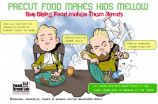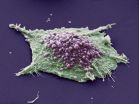(Press-News.org) There's a new secret to get your child to behave at the dinner table—cut up their food and they'll relax.
A new Cornell study published in Eating Behaviors, found that when 6-10 year old children ate foods they had to bite with their front teeth— such as drumsticks, whole apples, or corn on the cob— they were rowdier than when these foods had been cut. "They were twice as likely to disobey adults and twice as aggressive toward other kids," said Brian Wansink, Professor and Director of the Cornell Food and Brand Lab.
During a 4-H summer camp, 12 elementary children were observed for this 2-day study. On the first day, half of the children were seated at one picnic table and were given chicken on the bone that had to be bitten into with their front teeth; the other half were seated at a nearby picnic table and given chicken cut into bite sized pieces. On the second day, the conditions were reversed. Each day, two camp counselors instructed the children to stay inside a circle with a 9-foot radius. Both meal sessions were videotaped and evaluated by trained coders who indicated how aggressive or compliant the children were, and if they exhibited any atypical behaviors, such as jumping and standing on the picnic tables.
Results from both the counselors and coders observations indicated that when children were served chicken on the bone, they acted twice as aggressively, and were twice as likely to disobey adults, than when they were served bite sized pieces of chicken. Furthermore, the children who were served chicken on the bone left the circle without permission more frequently and were more likely to jump and stand on the picnic tables.
Along with Wansink, the research was conducted with Guido Camps now at Wageningen University and Research Center; Francesca Zampollo now at Auckland University of Technology; and Mitsuru Shimizu, now at Southern Illinois University Edwardsville.
In conclusion, the researchers note that when children need to bite into food with their front teeth, they are more likely to get rowdy! The bottom line for parents is this "If you want a nice quiet, relaxing meal with your kids, cut up their food," according to Wansink. He had different bottom line advice for school lunchroom staff, "If drumsticks, apples, or corn on the cob is on the menu, duck!"
INFORMATION:
Biting vs. chewing
Biting into whole foods can make children rowdy
2014-04-22
ELSE PRESS RELEASES FROM THIS DATE:
Bioinformatics profiling identifies a new mammalian clock gene
2014-04-22
PHILADELPHIA - Over the last few decades researchers have characterized a set of clock genes that drive daily rhythms of physiology and behavior in all types of species, from flies to humans. Over 15 mammalian clock proteins have been identified, but researchers surmise there are more. A team from the Perelman School of Medicine at the University of Pennsylvania wondered if big-data approaches could find them.
To accelerate clock-gene discovery, the investigators, led by John Hogenesch, PhD, professor of Pharmacology and first author Ron Anafi, MD, PhD, an instructor ...
Clinics not bogged down by red tape can ease health cost burdens
2014-04-22
Health clinics that can provide primary care for low-income patients may ease the financial burden on both hospitals and insurance companies while improving patient health, researchers have concluded.
A study of hospital admissions suggests that health clinics that avoid costs associated with insurance administration can help hospitals save money by lowering hospital admission rates and emergency room visits, according to Mark Agee, professor of economics, Penn State Altoona.
The researchers estimated that the major hospital in the area saved $201,414 annually in lower ...
Depressed? Researchers identify new anti-depressant mechanisms, therapeutic approaches
2014-04-22
DALLAS – April 22, 2014 – Researchers at UT Southwestern Medical Center are making breakthroughs that could benefit people suffering from depression.
A team of physician-scientists at UT Southwestern has identified a major mechanism by which ghrelin (a hormone with natural anti-depressant properties) works inside the brain. Simultaneously, the researchers identified a potentially powerful new treatment for depression in the form of a neuroprotective drug known as P7C3.
The study, published online in April's issue of Molecular Psychiatry, is notable because although ...
Scientists pinpoint protein that could improve small cell lung cancer therapies
2014-04-22
Approximately 15 percent of all lung cancers are small cell lung cancers (SCLC), which grow rapidly and often develop resistance to chemotherapy. However, researchers at Virginia Commonwealth University Massey Cancer Center have revealed new insights into the mechanisms leading to this resistance that may lead to improved therapies.
Chemotherapies work primarily by mediating B-cell lymphoma 2 (Bcl-2) family proteins, which are responsible for regulating cell death. Depending on their function, this family of proteins can trigger a form of cell suicide known as apoptosis ...
Risk of pregnancy greater with newer method of female sterilization
2014-04-22
(SACRAMENTO, Calif.) — The risk of pregnancy among women using a newer method of planned sterilization called hysteroscopic sterilization is more than 10 times greater over a 10-year period than using the more commonly performed laparoscopic sterilization, a study by researchers at Yale University and UC Davis has found.
Published online today in the medical journal Contraception, the study found the higher risk of pregnancy with a newer sterilization method marketed under the brand name Essure®.
"This study provides essential information for women and their doctors ...
PETA science consortium to present hazard testing strategy at nanotoxicology meeting
2014-04-22
London – PETA International Science Consortium Ltd.'s nanotechnology expert will present a poster titled "A tiered-testing strategy for nanomaterial hazard assessment" at the 7th International Nanotoxicology Congress to be held April 23-26, 2014, in Antalya, Turkey.
Dr. Monita Sharma will outline a strategy consistent with the 2007 report from the US National Academy of Sciences, "Toxicity Testing in the 21st Century: A Vision and a Strategy," which recommends use of non-animal methods involving human cells and cell lines for mechanistic pathway–based toxicity studies. ...
Nanoreporters tell 'sour' oil from 'sweet'
2014-04-22
Scientists at Rice University have created a nanoscale detector that checks for and reports on the presence of hydrogen sulfide in crude oil and natural gas while they're still in the ground.
The nanoreporter is based on nanometer-sized carbon material developed by a consortium of Rice labs led by chemist James Tour and is the subject of a new paper published this month in the American Chemical Society journal ACS Applied Materials and Interfaces.
Limited exposure to hydrogen sulfide causes sore throats, shortness of breath and dizziness, according to the researchers. ...
New research focuses on streamwater chemistry, landscape variation
2014-04-22
MISSOULA – Winsor Lowe, interim director of the University of Montana's Wildlife Biology Program, co-wrote a research paper published April 21 in the Proceedings of the National Academy of Sciences on how streamwater chemistry varies across a headwater stream network.
Lowe and co-authors from Virginia Tech, the U.S. Geological Survey, the University of Washington, the Cary Institute of Ecosystem Studies, the University of Connecticut and the U.S. Forest Service Northern Research Station examined 664 water samples collected every 10 meters along 32 tributaries ...
Online retailers have clear advantage by not collecting sales tax
2014-04-22
COLUMBUS, Ohio – Two independent studies use two very different approaches to reach the same conclusion: some online retailers really do have an advantage over traditional brick-and-mortar stores.
The studies find evidence from investors, analysts and consumers themselves that suggest online stores have a competitive edge when they don't have to collect sales tax from shoppers.
Both studies were conducted by researchers at the Fisher College of Business at The Ohio State University and their colleagues.
In one study, Brian Baugh, Itzhak Ben-David, and Hoonsuk Park ...
Scientists identify critical new protein complex involved in learning and memory
2014-04-22
JUPITER, FL, April 22, 2014 – Scientists from the Florida campus of The Scripps Research Institute (TSRI) have identified a protein complex that plays a critical but previously unknown role in learning and memory formation.
The study, which showed a novel role for a protein known as RGS7, was published April 22, 2014 in the journal eLife, a publisher supported by the Howard Hughes Medical Institute, the Max Planck Society and the Wellcome Trust.
"This is a critical building block that regulates a fundamental process—memory," said Kirill Martemyanov, a TSRI associate ...
LAST 30 PRESS RELEASES:
Brain cells drive endurance gains after exercise
Same-day hospital discharge is safe in selected patients after TAVI
Why do people living at high altitudes have better glucose control? The answer was in plain sight
Red blood cells soak up sugar at high altitude, protecting against diabetes
A new electrolyte points to stronger, safer batteries
Environment: Atmospheric pollution directly linked to rocket re-entry
Targeted radiation therapy improves quality of life outcomes for patients with multiple brain metastases
Cardiovascular events in women with prior cervical high-grade squamous intraepithelial lesion
Transplantation and employment earnings in kidney transplant recipients
Brain organoids can be trained to solve a goal-directed task
Treatment can protect extremely premature babies from lung disease
Roberto Morandotti wins prestigious Max Born Award for pioneering research in quantum photonics
Scientists map brain's blood pressure control center
Acute coronary events registry provides insights into sex-specific differences
Bar-Ilan University and NVIDIA researchers improve AI’s ability to understand spatial instructions
New single-cell transcriptomic clock reveals intrinsic and systemic T cell aging in COVID-19 and HIV
Smaller fish and changing food webs – even where species numbers stay the same
Missed opportunity to protect pregnant women and newborns: Study shows low vaccination rates among expectant mothers in Norway against COVID-19 and influenza
Emotional memory region of aged brain is sensitive to processed foods
Neighborhood factors may lead to increased COPD-related emergency department visits, hospitalizations
Food insecurity impacts employees’ productivity
Prenatal infection increases risk of heavy drinking later in life
‘The munchies’ are real and could benefit those with no appetite
FAU researchers discover novel bacteria in Florida’s stranded pygmy sperm whales
DEGU debuts with better AI predictions and explanations
‘Giant superatoms’ unlock a new toolbox for quantum computers
Jeonbuk National University researchers explore metal oxide electrodes as a new frontier in electrochemical microplastic detection
Cannabis: What is the profile of adults at low risk of dependence?
Medical and materials innovations of two women engineers recognized by Sony and Nature
Blood test “clocks” predict when Alzheimer’s symptoms will start
[Press-News.org] Biting vs. chewingBiting into whole foods can make children rowdy




